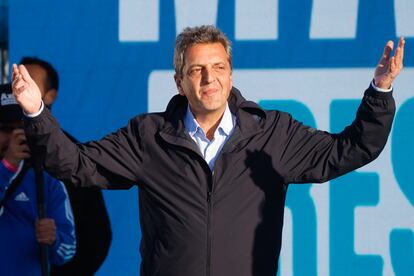Argentine karma
Sunday’s elections will be decided between an angry man who talks to his dead dog, an economy minister who is sinking what he is supposed to float and a former minister who has only displayed her inefficiency

In Spain, this past summer, general elections were held. Millions were worried: it seemed certain that, hand in hand with the Popular Party, the government would be led by an extremist group which denies climate change and male domestic violence, which seeks to eliminate sex education and abortion and the semi-federal system of autonomies, which vindicates Francoism and censures those who think differently. Let’s face it: because of that fear, many who were not particularly attracted to the ruling coalition, who perhaps in other circumstances would not have supported it, decided to vote for it in order to avoid the abyss.
In Argentina this Sunday there will be general elections. Millions are worried about the prospect of a man who not only denies climate change and gender violence, who not only intends to eliminate abortion and sex education and vindicate the genocidal military and censure those who are different, but who also wants to do away with public health and education, to allow the trafficking of arms and organs and, perhaps, of children, and who follows, he says, advice from beyond the grave from his dead dog. This gentleman, of course, does not tolerate any opinion that is not his own, and he proclaims as much loudly because he has, as he says, “the moral superiority.” The gentleman is scary. The problem, in Argentina today, is that many of those millions who fear him do not see any alternative: they do not know how to vote so that he does not win. Thus, the climate these days of confusion, fear, hopelessness.
The presidency is at stake among three candidates. The unhinged gentleman, Javier Gerardo Milei, was born in Buenos Aires in 1970, son of the owner of a couple of buses and a housewife, in the then modest neighborhood of Palermo. He was shy, he had trouble connecting with others. He went to a religious school, he wanted to become a soccer player but failed immediately, he played drums with some friends who covered the Rolling Stones and also failed at that, and he studied economics at a second- or third-rate university. He found himself a trade: he worked as a financial operator for one of the richest men in the country, Eduardo Eurnekián, owner of dozens of airports among many other things. Eurnekián was, they say, the one who supported him for years. First, when he was advising Peronist candidates and praising Obama. And later, when he began to become known for his outbursts and insults in the media, especially against the State and its politicians, who he called “the caste.” In 2021 he ran for deputy in Buenos Aires and was elected.

Since then, his popularity has soared. Millions of people who would like to break everything supported this man who walks around with a chainsaw — copied from Rand Paul, an American ultra-right-winger — to show that he too is willing to break everything. Those people do not think — do not believe — that what he breaks can break their own fragile livelihoods. With a conjuror’s flourish, the gentleman managed to present himself as something new: the old law of the jungle is dressed up as a novelty because he has disheveled hair, he shouts, and he despises everyone else: “Tremble, you lefty sons of bitches!” is one of his standard slogans. (And among those “communists” he includes Pope Francis, who this week, in an unusual gesture, gave an interview to the Argentine state press agency to answer him).
With those niceties, Mr. Milei managed to respond to the urgent need for something different: all the others did so badly that “a 1% chance of change is more than what we already have,” say his voters, and “at least it’s not the same as usual” and that it is worth trying. In proportion, Milei enjoys much more support among young men of middle and lower class backgrounds. They represent, among other things, the desperation of those who have not found their place or their future — and this moment when anti-progressivism becomes anti-feminist or vice versa.
Milei — conservative, chauvinist — managed to enthuse them. His politics is anti-politics, which is one of the most sought-after refuges of politicians, and he has been forming his party with “wounded” members of other formations. When one of them competes in local elections, they hardly get any votes; when Milei runs in his districts for the national elections, he gets more and more, so now he has a chance to win the presidency. It’s all about him: his movement is him, and he — always aggressive, paranoid — does not seem to be capable of governing anything.

To do so, he will have to defeat his two opponents. His closest challenger is Sergio Tomás Massa, who was born in a suburb of Buenos Aires in 1972, son of a small construction businessman and a housewife, both very Italian. He went to a religious school and then began to study law and became active on the political right wing. There he stood out: he was solvent, shrewd, knew how to talk and smile at the same time, and at the age of 22 he was already president of the Liberal Youth. But soon after he married the daughter of a Peronist leader and became a ditto: in the government of Carlos Menem, a neo-liberal Peronist, he combined his two tendencies and was awarded his first public positions — and he has remained there ever since. In that he was coherent; for that he had to be very incoherent: change after change, election after election, defection after defection, he always retained some kind of power. In 2007 he became mayor-regent of his wife’s city, Tigre. In 2008 he was Chief of the Cabinet of Ministers under Cristina Fernández de Kirchner and launched Kirchnerist harangues; in 2015 he ran against her in an election and denounced her intolerable corruption; in 2019 he once again joined her government and in August 2022, by her order, he was anointed Minister of Finance of a government and an economy headed for a shipwreck.
Those who might vote for him to avoid the Great Threat would have to put aside his failure: in his 14 months of his economic management, inflation is close to 140%, poverty stands at 41% and the dollar, the Lord of Argentina, went from costing 290 pesos to 1,000 — with the inestimable collaboration of Mr. Milei, who a few days ago came out to recommend the purchase of dollars because “the peso is the currency issued by the Argentine politician and that is why it is worth less than excrement.” Even so, it is not easy to resign oneself to maintain in power the person who has already been in power for more than a year with such dreadful results: what can he do after the event that he could not have done before? Nor is it easy to forget the lack of trustworthiness of a man who has changed ideas, parties, and policies like underpants — boxer shorts, probably.

The other mutant is Patricia Bullrich Luro Pueyrredón, who was born in Buenos Aires in 1956, daughter of a cardiologist and a well-to-do lady. Unlike her adversaries, products of the longed-for middle class, Ms. Bullrich is part of the “porteño oligarchy:” her ancestor Juan Martín de Pueyrredón ruled the country between 1816 and 1819, when it was not even called Argentina, and since then. Bullrich went to a school for rich girls but at 17, influenced by her older sister, she joined the Peronist Youth, which supported the Montoneros guerrillas. In 1975 she was arrested for painting slogans on a wall and spent six months in prison; after the 1976 coup she went into exile in Brazil. On her return, in 1983, she continued in Peronism and in 1993 she was elected as a deputy; seven years later she was Minister of Labor in the failed anti-Peronist government of Fernando de la Rúa. By the mid-2000s she was already a right-wing poster girl; in 2015 President Macri appointed her as his security chief and since then she has specialized. Now she has bukelized: she puts on a war face, talks a lot about criminals and prisons, promises to build more, and to make them more brutal. She has positioned herself so far to the right that, for many, it is difficult to vote for her to avoid the Unhinged Menace.
Moreover, Bullrich shares with Massa the weight of the past: she presents herself as a champion of the fight against crime but she has already been minister of the issue and produced more police excesses and dubious deaths than effective solutions. Now she wants to recover that profile of a tough woman, willing to do anything, but with orderliness; what she failed to do was to convince anyone that she is articulate, intelligent. Her economic tirades, in a country being dragged down by its economy, are pitiful stammering. The rest is just babble.
So, we Argentines are screwed: one third wants the Lord of the Hair to win and that is a blow to all the rest — those of us who do not understand how they can want that, those of us who believe that if they want it, it is because they have not stopped to listen and think about it, those of us who know that the situation is desperate and threatening but that it will not be fixed with desperation and brute threats. Milei has been playing the worse the better for months, celebrating every price increase as a personal triumph. He knows that many people will vote for him under the slogan “it can’t get any worse.” His problem is that many are realizing that it can get worse, much worse.
But those two thirds of us who fear it like hunger do not know what to do, who to vote for, how to oppose this destiny. We do not have a Pedro Sanchez or an Emmanuel Macron, a lesser evil to prevent the worst from taking over everything. The choice is stark: will voting for the devil you know be the way to avoid the one you don’t? Few are really convinced. Many, it is assumed, will not even bother to vote, in a country where voting is mandatory.
According to all calculations — yes, those that are always wrong — this Sunday Mr. Milei will get a majority of votes, but not enough to win without a second round. His rival in a potential runoff is an unknown, although many of those conjectures bet on Massa. Another story will begin there: how much fear of disaster will Milei produce? Enough for millions to vote for a catastrophic minister? A country has to be very screwed up to look for its salvation in those who have sunk it; and very screwed up to look for it in a perfectly unhinged person.
To sum up, just in case: Sunday’s elections will be decided between an angry man who talks to his dog, a Minister of Economy who is sinking what he is supposed to float and a former minister who has only displayed her inefficiency and very few plus points. This is Argentine karma, and it is difficult to see any encouraging future. There are those who say that, if anything, a Milei government could be so disastrous that it might be the “best” option: that it would lead the country to such a disaster that there would be no choice but to shuffle the pack and start over in earnest — while the other two only seem capable of continuing the old, constant, never-ending descent to nowhere. The problem is that such a disaster would put the lives of thousands, of millions, at risk. There would be hunger, deprivation, strife. The streets would be ablaze and Milei has already hinted that he might bring out the army to quell it.
Argentine karma in all its splendor: any result this Sunday will be punishment for decades of mistakes, of deceits, of betrayals. Millions of people are wondering which of the three candidates will be the mildest form, and they do not seem able to find an answer at the moment. Much less, one would say, hope.
Sometimes there are over-quoted phrases that suddenly seem to find the situation for which they were coined. Antonio Gramsci, who died after many years of fascist imprisonment in 1937, at 46, wrote that “the old world is dying and the new one is slow in coming. In this chiaroscuro, monsters are born.”
Sign up for our weekly newsletter to get more English-language news coverage from EL PAÍS USA Edition
Tu suscripción se está usando en otro dispositivo
¿Quieres añadir otro usuario a tu suscripción?
Si continúas leyendo en este dispositivo, no se podrá leer en el otro.
FlechaTu suscripción se está usando en otro dispositivo y solo puedes acceder a EL PAÍS desde un dispositivo a la vez.
Si quieres compartir tu cuenta, cambia tu suscripción a la modalidad Premium, así podrás añadir otro usuario. Cada uno accederá con su propia cuenta de email, lo que os permitirá personalizar vuestra experiencia en EL PAÍS.
¿Tienes una suscripción de empresa? Accede aquí para contratar más cuentas.
En el caso de no saber quién está usando tu cuenta, te recomendamos cambiar tu contraseña aquí.
Si decides continuar compartiendo tu cuenta, este mensaje se mostrará en tu dispositivo y en el de la otra persona que está usando tu cuenta de forma indefinida, afectando a tu experiencia de lectura. Puedes consultar aquí los términos y condiciones de la suscripción digital.









































